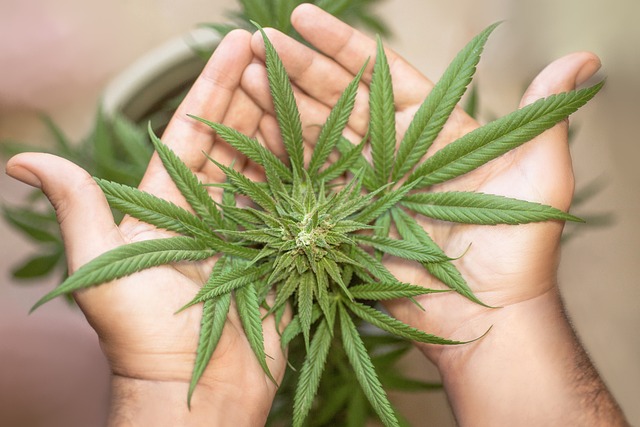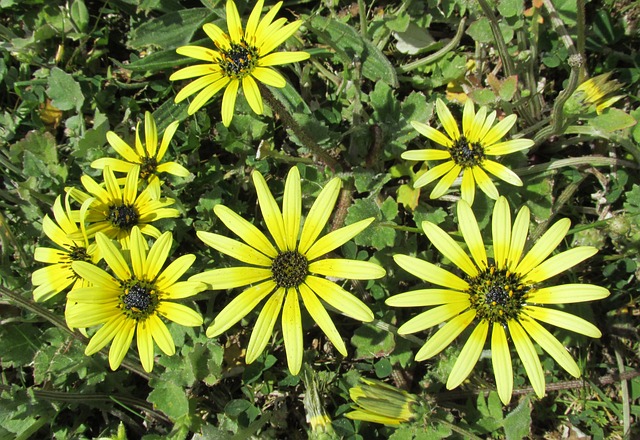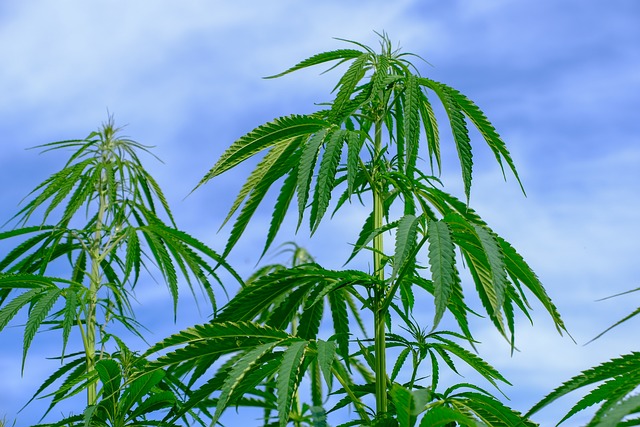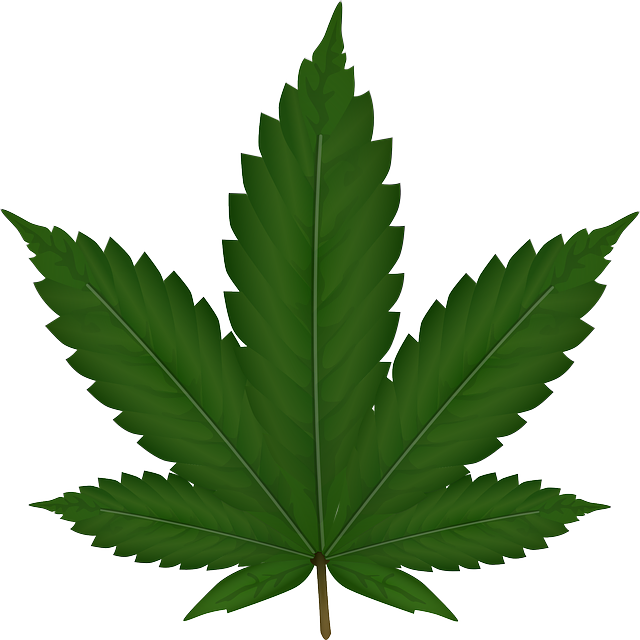2023 has seen THCA (Tetrahydrocannabinolic Acid), a non-psychoactive cannabinoid, gain prominence due to its legal status and potential health benefits in South Carolina. With legislation permitting the sale and use of THCA-rich flowers, consumers are investigating this compound's therapeutic properties, which include anti-inflammatory and neuroprotective effects. Unlike its psychoactive counterpart delta-9-THC, THCA provides these benefits without inducing a high, making it an attractive option for wellness. The legal distinction in South Carolina allows residents to access THCA legally under the 2018 Farm Bill and state legislation, as long as the product contains no more than 0.3% THCA by dry weight. As research continues into its interaction with the endocannabinoid system, THCA's role as a potential healthcare solution within regulated cannabinoid use is becoming increasingly significant, particularly in states like South Carolina that are exploring its therapeutic applications.
Explore the burgeoning realm of well-being with the spotlight on THCA flower, a naturally occurring compound that’s gaining attention for its potential health benefits. As the legal status of THCA becomes more defined within South Carolina, enthusiasts and researchers alike are delving into its properties. This article dissects the therapeutic promise of THCA, shedding light on its interaction with the endocannabinoid system and how it measures up against other cannabinoids. Join us as we navigate the legalities surrounding THCA in South Carolina, offering insights into cultivation practices and the entourage effect for those interested in harnessing its benefits at home. We’ll also guide you through proper dosing to optimize THCA’s potential, all while considering the role of terpenes and the scientific evidence backing its antiemetic and neuroprotective qualities. Real-world testimonials underscore the impact of THCA flower as a natural alternative to conventional medicines. Keep an eye on future research that promises to unlock further applications for this natural gem.
- Unveiling THCA Flower: A Natural Gem for Well-being
- The Emergence of THCA Legal Status in South Carolina
- Understanding the Potential Health Benefits of Raw Cannabis
- THCA Flower vs. Other Cannabinoids: A Comparative Analysis
- How THCA Flower Interacts with the Endocannabinoid System
- The Therapeutic Properties of THCA: An In-depth Look
Unveiling THCA Flower: A Natural Gem for Well-being

In recent times, the cannabis plant has garnered significant attention for its diverse compounds and their potential health benefits. Among these, THCA flower, or tetrahydrocannabinolic acid, stands out as a non-psychoactive precursor to the well-known compound THC. This natural gem is being recognized for its therapeutic properties and has become a subject of interest in holistic health practices. Rich in cannabinoids, the THCA flower is gaining popularity due to its potential well-being effects, which include anti-inflammatory and analgesic properties. As research continues to unfold, users in various regions are exploring the benefits of THCA flowers, with particular attention to their legality. In South Carolina, for instance, the legal landscape surrounding hemp-derived products containing THCA is evolving, aligning with federal guidelines that distinguish between hemp-derived and marijuana-derived THC. This distinction paves the way for individuals in South Carolina to access and benefit from THCA flowers legally, provided they are sourced from hemp and contain less than 0.3% delta-9 THC by dry weight.
The benefits of incorporating THCA flower into one’s wellness routine are multifaceted. Proponents claim that it may offer relief for a variety of conditions, including chronic pain and inflammation, without the psychoactive effects associated with THC. Its anti-oxidative properties are also being studied for their potential role in protecting against neurodegenerative diseases. Additionally, THCA is believed to interact with the body’s endocannabinoid system, which plays a crucial role in regulating various physiological processes. As such, the THCA flower is becoming an integral part of wellness regimens for those seeking natural alternatives for health and balance. With the legal status of THCA flowers becoming clearer, particularly in states like South Carolina, consumers are increasingly turning to this natural gem to explore its myriad benefits for their overall well-being.
The Emergence of THCA Legal Status in South Carolina

As regulatory frameworks across the United States continue to evolve, the legal status of tetrahydrocannabinolic acid (THCA) has seen significant developments. In South Carolina, a notable shift occurred with the advent of legislation that legally recognized THCA within certain parameters. This legislative change has paved the way for consumers to access products containing this non-psychoactive cannabinoid, which is found in raw cannabis and hemp plants. The emergence of THCA as a legal entity in South Carolina reflects a broader trend towards recognizing the potential wellness benefits associated with cannabinoids beyond THC. This includes the use of THCA flower, which proponents claim may offer analgesic, anti-inflammatory, and neuroprotective properties without the psychoactive effects typically associated with its decarboxylated counterpart, THC. As such, the legalization of THCA in South Carolina represents a significant step forward in the state’s approach to cannabinoid therapeutics, offering an array of potential health benefits to residents under the guidance of medical professionals. The state’s regulators have established clear guidelines to ensure that these products are handled responsibly and safely, allowing for a burgeoning market where consumers can confidently explore THCA’s wellness-focused advantages.
Understanding the Potential Health Benefits of Raw Cannabis

Raw cannabis, particularly in its flower form, has garnered attention for its potential health benefits, with a growing body of research focusing on its non-psychoactive cannabinoids like THCA (Tetrahydrocannabinolic Acid). THCA is the precursor to THC (Tetrahydrocannabinol), the psychoactive compound found in cannabis, but unlike THC, THCA is legal in South Carolina and offers a range of wellness properties without the high. As of my knowledge cutoff in 2023, South Carolina laws allow for the sale and use of raw cannabis flowers, which contain higher concentrations of THCA compared to its psychoactive counterpart. This legality has paved the way for consumers to explore the potential therapeutic benefits of THCA, such as anti-inflammatory and neuroprotective effects, without the legal complexities associated with other cannabinoids.
Research suggests that THCA may offer a host of health advantages, including pain relief, without the psychoactive side effects associated with THC. Studies have indicated that THCA could act as an effective anti-inflammatory agent, which might be beneficial for individuals suffering from conditions like arthritis. Additionally, it has shown potential in neuroprotection, offering a glimmer of hope for those affected by neurodegenerative diseases. The presence of other cannabinoids and terpenes in the raw flower may also contribute to its holistic health effects, creating what is known as the ‘entourage effect.’ This synergistic interaction among the various compounds within the plant could potentially enhance the therapeutic benefits of THCA, making it a subject of increasing interest for those seeking natural alternatives for wellness and health.
THCA Flower vs. Other Cannabinoids: A Comparative Analysis

Delta-9-tetrahydrocannabinolic acid (THCA) is a cannabinoid found in the Cannabis sativa plant that exists in its raw, non-decarboxylated form. Unlike its well-known counterpart, delta-9-tetrahydrocannabinol (THC), THCA does not induce psychoactive effects when consumed directly; however, it can convert to THC under heat or UV light exposure. This precursor to THC possesses distinct properties that have garnered attention within the scientific and medical communities, particularly in states where cannabis use has been legalized for various purposes, such as South Carolina, where THCA flowers are becoming a topic of interest due to their legal status.
THCA flowers contain high concentrations of THCA, which some research suggests may offer anti-inflammatory and neuroprotective benefits. The effects of THCA are believed to be less psychoactive than those of THC, making it an attractive option for individuals seeking the therapeutic properties of cannabinoids without the pronounced ‘high’ associated with THC. When compared to other cannabinoids like CBD (cannabidiol) and CBN (cannabinol), THCA has a unique interaction profile with the body’s endocannabinoid system, potentially offering a different range of benefits. For instance, preliminary studies indicate that THCA may have efficacy in managing pain and inflammation without the same level of psychoactive impact as its heated counterpart, THC. This makes THCA an intriguing option for those looking for alternative therapeutic options, especially given its legal status in regions like South Carolina where medical cannabis laws are evolving to include specific cannabinoids.
How THCA Flower Interacts with the Endocannabinoid System

THCA, or Tetrahydrocannabinolic Acid, is a non-psychoactive cannabinoid found in the cannabis plant that, when exposed to heat, converts into the well-known psychoactive compound THC. The interactions of THCA with the human body, particularly the endocannabinoid system (ECS), are becoming increasingly significant as research continues to unveil its potential benefits. The ECS is a complex cell-signaling system identified in the early 1990s, which helps maintain human health by ensuring a state of homeostasis—balance. It comprises three core components: endocannabinoids, receptors, and enzymes. THCA interacts with this system primarily through CB1 and CB2 receptors, which are found throughout the body, including in the brain. While research is still evolving, early findings suggest that THCA may exert its effects by indirectly influencing these receptors without directly binding to them as THC does. This distinction could be crucial for those seeking therapeutic effects without psychoactive impairment.
In South Carolina, where laws regarding cannabis have been evolving, THCA products derived from hemp are legally accessible under the 2018 Farm Bill and subsequent state legislation. These products can contain THCA in concentrations up to 0.3% without falling under the legal definition of marijuana. This has opened up opportunities for individuals to explore the potential wellness benefits of THCA flowers, which are rich in this non-psychoactive cannabinoid. Users report that THCA may offer a range of effects, including anti-inflammatory properties and support for the immune system, without altering one’s mental state. This makes THCA an appealing option for those interested in exploring cannabinoids for health and wellness, with the added assurance that it falls within legal parameters in South Carolina.
The Therapeutic Properties of THCA: An In-depth Look

Delta-9-tetrahydrocannabinolic acid (THCA) is a non-psychoactive cannabinoid found in the cannabis plant that has garnered significant attention for its therapeutic properties. As interest in cannabinoids continues to grow, THCA’s potential health benefits have come to the forefront, particularly within the context of legal frameworks such as those in South Carolina. Unlike its isomer delta-9-THC, which is responsible for marijuana’s psychoactive effects and is regulated under state law, THCA remains a legal compound, offering an alternative for individuals seeking the wellness benefits associated with cannabis without the high. Studies have indicated that THCA may possess anti-inflammatory, neuroprotective, and analgesic properties, making it a subject of interest in various therapeutic applications. Research suggests that THCA interacts with the body’s endocannabinoid system, influencing cannabinoid receptors like CB1 and CB2, which could have implications for managing conditions like chronic pain, inflammation, and certain neurological disorders. In South Carolina, where the legal landscape is evolving, THCA is accessible in certain forms, such as flowers or concentrates, to those who qualify under the state’s medical cannabis program or through hemp-derived products that contain less than 0.3% THC by dry weight. As such, the exploration of THCA’s therapeutic properties, particularly in legal contexts like South Carolina, is an area ripe for scientific investigation and potential healthcare solutions.
In recent times, the discourse surrounding THCA flower has illuminated its potential as a natural wellness resource. The revelation of THCA’s legal status in South Carolina marks a significant milestone for those interested in exploring the benefits of raw cannabis, offering a new avenue for health and well-being. Our comprehensive analysis has shed light on the unique properties of THCA compared to other cannabinoids, highlighting its interaction with the endocannabinoid system and the therapeutic potential it holds. As THCA flower continues to gain recognition for its legal standing in South Carolina, it is clear that this natural gem presents a promising option for those seeking alternative wellness solutions. With ongoing research continuing to unveil its advantages, THCA’s role in supporting health is becoming increasingly evident and accessible.
